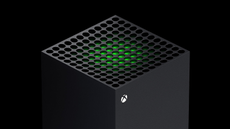Since the Nintendo Switch OLED was officially announced we've known that, screen aside, the console is basically identical to the original Nintendo Switch. The Switch OLED has the same half-decade-old internal hardware powering it and, as a result, will almost certainly offer little to no performance improvement when released.
We've also known since launch that the Steam Deck delivers orders of magnitude more powerful gaming hardware under the hood than Switch OLED, with a custom built AMD APU delivering a quad-core Zen 2 CPU with eight threads and eight CUs of RDNA2 GPU power. Valve also revealed at launch that this APU would be combined with 16GB of dual-channel LPDDR5 RAM. On paper, it sounded like a great hardware package.
However, that hardware package has just been confirmed as even more impressive than anyone thought.
That's because, as highlighted by a gamer on Twitter, Valve had made a mistake when listing the specs of the Steam Deck, which after being made aware of, has now gone and corrected.
A discussion and curiosity is resolved now.Van Gogh, which is used by Valve's Steam Deck, has 4 UMCs.I expected 4x 16-Bit (a memory channel under LPDDR5 is actually 16-Bit wide). The official spec claimed 5.5 Gbps (dual-channel), which didn't made sense to me.It got corrected pic.twitter.com/orgzMKJldEJuly 19, 2021
What Valve had done was listed the Steam Deck as coming with dual-channel LPDDR5 RAM, when in fact it came with quad-channel 32-bit LPDDR5 RAM instead. And this, while seeming like a small thing, is actually as big thing in terms of Steam Deck potential performance, as it means it will have a far greater memory bandwidth than first thought, and especially so in light of its estimated GPU performance.
This extra bandwidth is important as the system's APU, which contains both its CPU and GPU, with both chips using the same memory allotment. As such, that memory needs to be able to adequately serve both CPU and GPU at the same time, and that's where the larger bandwidth delivered by the console's quad-channel memory (rather than only dual-channel) can help.
The result of this discovery? The Steam Deck is more powerful than anyone thought, even some people at Valve, clearly. And that's great news for anyone who has locked in a Steam Deck pre-order, as the system they've got on-lock is now officially more powerful in terms of internal hardware than they thought.
It also gives food for thought for gamers who may now be questioning their Nintendo Switch OLED pre-order, as the console they've ordered is, in terms of internal hardware, even weaker than first thought in comparison.
- These are the best gaming chairs to play Steam Deck on when it releases











